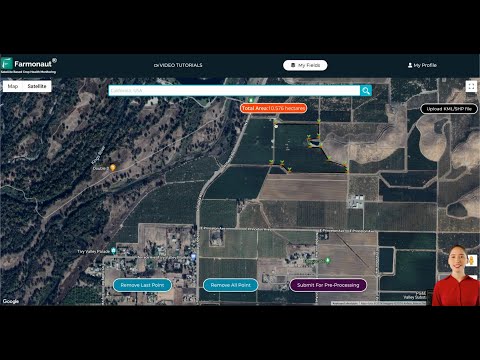2024 USDA Farm Service Agency Update: West Virginia Farmers’ Guide to Assistance Programs and Deadlines

“The 2024 USDA Farm Service Agency update introduces online loan payment options for West Virginia farmers, modernizing financial management.”
As we step into 2024, the United States Department of Agriculture’s (USDA) Farm Service Agency (FSA) has unveiled crucial updates that promise to reshape the landscape for West Virginia’s agricultural producers. At Farmonaut, we recognize the importance of staying informed about these federal resources and how they can bolster farm resilience and promote agricultural conservation. In this comprehensive guide, we’ll explore the latest FSA programs, deadlines, and assistance initiatives tailored for West Virginia farmers and ranchers.
Enhanced Financial Resources for West Virginia Producers
The USDA’s commitment to supporting our state’s agricultural community is evident in the array of financial resources now available. These programs are designed to provide a safety net for producers facing challenges ranging from natural disasters to market fluctuations.
- Emergency Livestock Assistance: This program offers critical support for livestock producers affected by adverse weather conditions or other emergencies.
- Drought Recovery Initiatives: With climate challenges persisting, these initiatives aim to help farmers bounce back from the effects of prolonged dry spells.
- Conservation Reserve Program (CRP): The latest signup period reflects the USDA’s ongoing dedication to sustainable farming practices.
It’s crucial for West Virginia farmers to understand how these programs can be leveraged to strengthen their operations and protect against unforeseen challenges.
Key Deadlines and Program Updates
As we navigate through the agricultural calendar of 2024, several important dates and program updates stand out:
- Non-Insured Crop Disaster Assistance Program (NAP): West Virginia farmers should take note of the approaching deadline for hay insurance through this vital program.
- Conservation Reserve Program Signup: The latest period for enrolling in this environmental stewardship initiative is now open.
- Online Loan Payment Options: The FSA’s modernization efforts have introduced new digital payment methods, streamlining financial management for producers.
These updates reflect the FSA’s commitment to adapting to the evolving needs of the agricultural community while maintaining its core mission of support and conservation.
Emergency Conservation Program (ECP) for Drought-Impacted Producers
The USDA has approved the Emergency Conservation Program for agricultural producers in West Virginia who have been impacted by drought. This program is designed to provide financial and technical assistance to farmers and ranchers to rehabilitate farmland damaged by natural disasters and to implement emergency water conservation measures during severe drought.
- Eligibility: Producers who have suffered severe damage to their farmland due to drought conditions.
- Assistance Provided: Cost-share payments for implementing emergency conservation practices.
- Application Process: Contact your local FSA office to submit an application and schedule an on-site inspection.
The ECP is a critical resource for West Virginia farmers facing the challenges of drought, helping to ensure the continuity of agricultural operations in the face of adverse weather conditions.
Disaster Assistance for West Virginia Agricultural Producers
In response to the ongoing drought conditions affecting West Virginia, the USDA is offering a comprehensive suite of disaster assistance programs. These initiatives are designed to help farmers and ranchers recover from the effects of natural disasters and continue their vital role in food production.
Key disaster assistance programs include:
- Livestock Forage Disaster Program (LFP): Provides compensation to eligible livestock producers who have suffered grazing losses due to drought.
- Emergency Assistance for Livestock, Honeybees, and Farm-Raised Fish Program (ELAP): Offers financial assistance for losses that are not covered by other disaster assistance programs.
- Tree Assistance Program (TAP): Provides financial assistance to qualifying orchardists and nursery tree growers to replant or rehabilitate eligible trees, bushes, and vines damaged by natural disasters.
These programs underscore the USDA’s commitment to supporting West Virginia’s agricultural sector through challenging times, ensuring the resilience of our farming communities.
Expanded Emergency Livestock Assistance Program for Dairy Producers
In a significant development for dairy farmers, the USDA has announced an expansion of the Emergency Livestock Assistance Program to help offset milk loss due to the H5N1 avian influenza outbreak.
This expanded program offers critical support to dairy producers who have experienced significant losses due to the impact of H5N1 on their operations. Key points of the program include:
- Eligibility: Dairy producers who have suffered milk losses directly attributed to H5N1 outbreaks.
- Compensation: Producers can receive financial assistance to partially offset their milk production losses.
- Application Process: Applications are now being accepted through local FSA offices.
This initiative demonstrates the USDA’s responsiveness to the evolving challenges faced by the dairy industry and its commitment to maintaining a stable food supply chain.
Physical Disaster Loans: Approaching Deadline
West Virginia farmers and agricultural businesses affected by physical disasters should be aware of the approaching deadline for applying for Physical Disaster Loans through the Small Business Administration (SBA).
These loans are crucial for rebuilding and recovering from physical damage caused by declared disasters. Key points to remember:
- Purpose: To repair or replace disaster-damaged property owned by the business, including real estate, machinery, equipment, and inventory.
- Eligibility: Businesses of all sizes and private nonprofit organizations.
- Loan Terms: Low-interest rates and long-term repayment options available.
- Application Deadline: Rapidly approaching – check with your local SBA office for exact dates.
We strongly encourage eligible West Virginia farmers and agricultural businesses to consider this opportunity for financial assistance in their recovery efforts.

“West Virginia farmers face an approaching deadline for hay insurance through the Non-Insured Crop Disaster Assistance Program in 2024.”
2024 USDA Farm Service Agency Programs for West Virginia Farmers
| Program Name | Purpose | Eligibility Criteria | Application Deadline | Estimated Funding Available |
|---|---|---|---|---|
| Emergency Livestock Assistance | Support for livestock producers affected by adverse weather or emergencies | Livestock producers with documented losses | Ongoing | $500 million nationwide |
| Drought Recovery Initiatives | Assist farmers in recovering from prolonged dry spells | Farmers in designated drought areas | Various, based on declaration dates | $200 million for affected regions |
| Conservation Reserve Program | Promote sustainable farming practices and land conservation | Landowners with eligible acreage | March 15, 2024 | $1.8 billion annually |
| Non-Insured Crop Disaster Assistance Program | Provide financial assistance for non-insurable crop losses | Producers of non-insurable crops | Varies by crop, approaching for hay | Based on crop value and loss |
Leveraging Technology for Farm Management
As we navigate these USDA programs, it’s crucial to recognize the role of technology in modern farm management. At Farmonaut, we understand the importance of integrating innovative solutions with traditional farming practices. Our satellite-based farm management platform offers tools that complement the USDA’s efforts in promoting sustainable and efficient agriculture.
Key features of Farmonaut’s platform include:
- Real-time crop health monitoring
- AI-based advisory systems for optimal resource management
- Weather forecasting to support decision-making
- Tools for efficient fleet and resource management
By utilizing these technological advancements, West Virginia farmers can enhance their ability to make informed decisions, potentially maximizing the benefits they receive from USDA programs.
Explore Farmonaut’s solutions:
Conservation Reserve Program (CRP) Signup: A Focus on Sustainable Farming
The Conservation Reserve Program remains a cornerstone of the USDA’s efforts to promote environmentally friendly farming practices. The 2024 signup period presents a significant opportunity for West Virginia farmers to contribute to land conservation while receiving financial incentives.
- Program Objectives: Protect environmentally sensitive land, decrease soil erosion, improve water quality, and enhance wildlife habitats.
- Eligibility: Landowners with eligible acreage that has been in agricultural production.
- Benefits: Annual rental payments and cost-share assistance for establishing long-term, resource-conserving plant species.
- Signup Period: Open until March 15, 2024
Participating in the CRP not only contributes to environmental conservation but can also provide a stable income stream for farmers, especially on less productive land.
Non-Insured Crop Disaster Assistance Program (NAP): Securing Your Harvest
For West Virginia farmers growing crops not covered by traditional crop insurance, the Non-Insured Crop Disaster Assistance Program offers a crucial safety net. With the deadline for hay insurance rapidly approaching, it’s essential to understand the benefits and requirements of this program.
- Coverage: Provides financial assistance for losses due to natural disasters on crops that are ineligible for Federal Crop Insurance.
- Eligible Crops: Includes crops like hay, honey, and many specialty crops.
- Application Process: Contact your local FSA office to apply and pay the service fee.
- Deadline: Varies by crop, with the hay insurance deadline imminent.
NAP can be a vital tool in risk management, especially for diversified farms and those growing specialty crops. We encourage farmers to explore this option to protect their agricultural investments.
Modernizing Farm Financial Management
In a significant move towards modernization, the FSA has introduced online loan payment options for West Virginia farmers. This development aligns with the growing trend of digital integration in agriculture, a field where Farmonaut has been at the forefront.
Benefits of online loan payments include:
- Increased convenience and flexibility for farmers
- Reduced paperwork and administrative burden
- Improved accuracy in financial transactions
- Real-time payment processing and account updates
This digital shift not only streamlines financial operations for farmers but also aligns with broader efforts to modernize agricultural practices. At Farmonaut, we understand the importance of integrating technology into every aspect of farm management, from field operations to financial planning.
For more information on leveraging technology in agriculture, visit our API page or explore our API Developer Docs.
Climate Resilience and Agricultural Conservation
As climate challenges persist, the USDA’s focus on bolstering farm resilience and promoting agricultural conservation has never been more critical. The 2024 updates to FSA programs reflect this priority, offering West Virginia farmers tools and resources to adapt to changing environmental conditions.
- Drought Mitigation: Programs specifically designed to help farmers recover from and prepare for drought conditions.
- Soil Health Initiatives: Encouragement and support for practices that improve soil quality and reduce erosion.
- Water Conservation: Assistance in implementing water-saving technologies and practices.
- Sustainable Farming Practices: Incentives for adopting environmentally friendly farming methods.
These initiatives not only help protect the environment but also contribute to the long-term sustainability and profitability of West Virginia farms. By participating in these programs, farmers can play a crucial role in combating climate change while safeguarding their livelihoods.
Navigating Eligibility and Application Processes
Understanding the eligibility criteria and application processes for FSA programs is crucial for West Virginia farmers seeking to benefit from these resources. While each program has its specific requirements, there are some general guidelines to keep in mind:
- Farm Registration: Ensure your farm is registered with the FSA and your information is up to date.
- Documentation: Maintain accurate records of farm operations, including production history and disaster impacts.
- Timely Applications: Be aware of and adhere to application deadlines for each program.
- Compliance: Stay in compliance with conservation and wetland protection requirements.
We recommend contacting your local FSA office for personalized guidance on program eligibility and application procedures. Their expertise can be invaluable in navigating the complexities of federal agricultural programs.
Farmonaut: Enhancing Farm Management with Technology
As we discuss these crucial USDA programs, it’s important to highlight how technology can complement and enhance farm management practices. Farmonaut’s satellite-based solutions offer tools that can help West Virginia farmers make the most of these federal resources:
- Crop Health Monitoring: Our satellite imagery analysis can help identify potential issues early, supporting timely applications for disaster assistance programs.
- Resource Management: Efficient resource allocation tools can help farmers meet conservation program requirements more effectively.
- Weather Forecasting: Accurate weather predictions support informed decision-making, crucial for programs like the Non-Insured Crop Disaster Assistance Program.
By integrating Farmonaut’s technology with USDA programs, farmers can enhance their operational efficiency and maximize the benefits of federal assistance.
Looking Ahead: The Future of Agriculture in West Virginia
As we navigate through 2024 and beyond, the landscape of agriculture in West Virginia continues to evolve. The USDA’s Farm Service Agency programs, combined with technological advancements in the field, present both challenges and opportunities for our state’s farmers.
- Adapting to Climate Change: Continued focus on resilience and sustainable practices will be crucial.
- Embracing Technology: Integrating tools like those offered by Farmonaut can significantly enhance farm management and productivity.
- Diversification: Exploring new crops and farming methods may become increasingly important for long-term sustainability.
- Community Collaboration: Strengthening connections between farmers, local agencies, and agricultural technology providers will be key to navigating future challenges.
By staying informed about USDA programs and leveraging available technologies, West Virginia farmers can position themselves for success in an ever-changing agricultural landscape.
Frequently Asked Questions
Q: How can I determine if my farm is eligible for USDA Farm Service Agency programs?
A: Eligibility varies by program, but generally, you need to be a farmer, rancher, or forest landowner actively engaged in agricultural production. Contact your local FSA office for specific eligibility criteria for each program.
Q: What documentation do I need to apply for FSA disaster assistance programs?
A: Typically, you’ll need proof of identity, farm records, production history, and documentation of losses. Specific requirements may vary by program, so check with your local FSA office for a complete list.
Q: How often are Conservation Reserve Program signups held?
A: CRP signups are usually held annually, but the exact timing can vary. The current signup period for 2024 is open until March 15, 2024.
Q: Can I participate in multiple FSA programs simultaneously?
A: Yes, in many cases you can participate in multiple programs. However, there may be restrictions or requirements to prevent duplication of benefits. Consult with an FSA representative to understand how different programs can complement each other for your specific situation.
Q: How can Farmonaut’s technology help me maximize the benefits of USDA programs?
A: Farmonaut’s satellite-based monitoring and AI-driven insights can help you make informed decisions about crop management, resource allocation, and conservation practices. This data can support your applications for various USDA programs and help you meet program requirements more effectively.
Conclusion
The 2024 USDA Farm Service Agency updates bring a wealth of opportunities for West Virginia farmers. From emergency assistance to conservation initiatives, these programs offer vital support for our agricultural community. By staying informed, leveraging available resources, and embracing technological advancements like those offered by Farmonaut, West Virginia farmers can enhance their resilience, sustainability, and profitability.
We encourage all agricultural producers in our state to explore these programs, reach out to local FSA offices for personalized guidance, and consider how technology can complement their farming practices. Together, we can build a stronger, more sustainable future for West Virginia agriculture.







